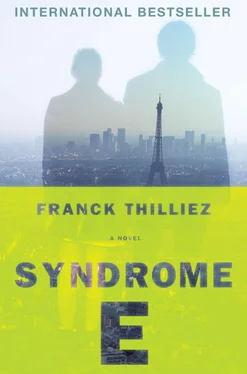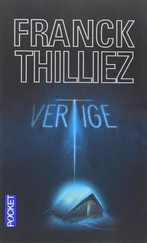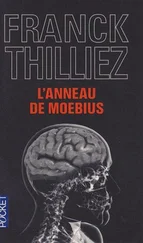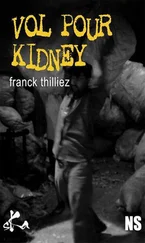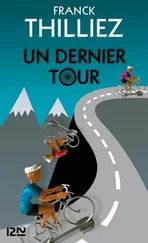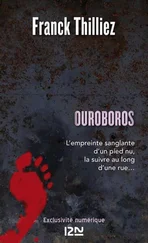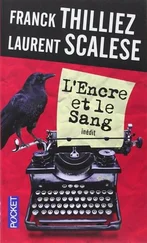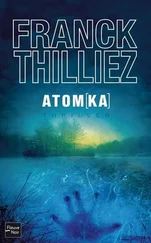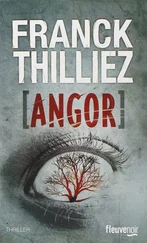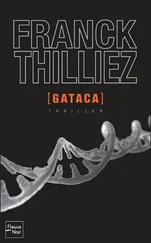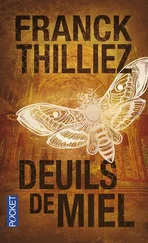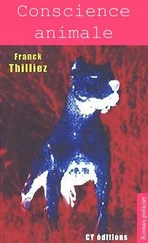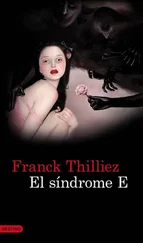Juliette climbed back into bed, exhausted by her illness. When the nurse came to take her vitals, she noted with a frown, “Two spoonsful of puree, half a biscuit, and no ham.” In other words, they weren’t about to take out her IV yet. Which meant bye-bye to even the hope of getting out of there soon.
Worn out, Lucie remained with her daughter until the little girl fell asleep; her eyes stared blankly at the TV screen.
The news talked of that sordid affair in Upper Normandy near a pipeline. A bunch of corpses, skulls sawed open… A profiler on the case, whose face she saw onscreen at that instant. A solid-looking guy, built like a cop and definitely not like a shrink. Where did he come from, which school? Had he already had experience with serial killers? In a way, Lucie envied him. This business of bodies with sawed-off skulls was the kind of case that would have got her revved up like nothing else. The thrill of discovery, tracking down a sick and dangerous criminal. But she was on vacation, for God’s sake, and it was the middle of summer. A time when people were supposed to be enjoying themselves, letting go, giving their brains a rest. This evening, alone, with her kid in some lost corner of the hospital, she felt light-years away from people like that.
Lucie placed a new stuffed toy near Juliette—a blue elephant, brought by her mother—told the nurse she was leaving, then headed over to Salengro Hospital, a hundred yards from the pediatric wing. Dr. Tournelle had news about Ludovic Sénéchal.
The physician met her in a large room, in which a scanner and cutting-edge equipment were visible behind wide panes of glass. Facing Lucie on a luminescent wall was a spread of X-rays. On a table lay articles and anatomical diagrams of the eye, nervous system, and brain. The doctor was edgily rubbing his chin. Since she’d seen him that morning, his hair had shriveled on his skull and the bags under his eyes had swollen. He wasn’t as seductive as before. Just some overworked guy like anyone else.
“We spent the day running tests. Ludovic Sénéchal was transferred to the psych ward in Freyrat about an hour ago.”
Lucie was floored.
“Psych ward? What for?”
Tournelle removed his glasses and massaged his temples.
“Let me try to explain in layman’s terms. Ludovic is not blind, in the physiological sense. As I told you this morning, our evaluation of his pupillary reflexes and ocular structures revealed no significant abnormalities. On the other hand, the patient presents with an unfocused gaze and absence of visual contact.”
“You mentioned psychiatry. So it wasn’t a tumor?”
The doctor turned toward the two dozen X-rays depicting Ludovic’s brain and pulled one down.
“No. Look—it’s all clear. Not the slightest anomaly.”
He might just as well have been showing her the brain of a cow. Still, Lucie felt reassured: Ludovic wasn’t going to die.
“I’ll take your word for it.”
“We also looked for lesions around the visual cortex, which might have explained a cortical blindness, but we didn’t find anything there either.”
“Cortical blindness?”
The doctor gave her a tired smile.
“We tend to believe that sight is in the eye, but that’s just a tool, a kind of light well. Read this, you’ll understand.”
Lucie took the printed card that he handed her:
This txet will demonsrtate that yuor brian dose not trnaslate exaclty waht yuor eye sees. Intsaed, infulecned by waht it has laerend, it reocignzes wrods golbally, wihtuot paynig muhc attnetoin ot teh ordre of teh lettres.
“Impressive.”
“Isn’t it? The retina just lends its body, so to speak, to materialize a physical image, like a movie screen. It’s just a passive object, a lens. The brain is what interprets life experience, the cultural context, according to its knowledge. It’s the brain that makes the image what it is: a meaningful object.”
He put the X-ray back in its place.
“The remarkable thing about this patient is that he can avoid certain obstacles without seeing them. A box we put in his path, for instance. A chair, a dresser. We filmed it—you can watch the recordings. It’s really amazing.”
“No, thanks. That’s okay. So he sees without seeing. That’s incomprehensible.”
“Incomprehensible from a medical standpoint. But if we physicians can’t find anything, it means the origin is psychological.”
“Are you talking about something like… depression, or schizophrenia? Something along those lines, that’s keeping him from seeing?”
“You’d be closer to the mark talking about neurosis, anxiety, phobia, or hysteria. Personally, we’re leaning toward hysterical blindness. That’s a sensory disturbance that falls under the conversion hysterias: imaginary paralysis, deafness, numbness of the limbs… Perhaps the best-known example is the phantom limb.”
He shut off the lights and asked Lucie to follow him down the corridors of the neurology ward. The wan lighting gave the place an antiseptic, futuristic look.
“A psychiatrist could tell you more about this than I can, but hysteria is a defense mechanism meant to protect the psyche from a sudden shock. It can be triggered by an event that has something to do with the patient’s childhood. Some element that was profoundly traumatizing.”
“Could certain images cause this?”
“I know what you’re talking about. That film that supposedly drove him blind… Mr. Sénéchal has not stopped talking about it. Yes, in theory that’s possible, and given the circumstances I think the cause comes from there. His blindness occurred in the middle of the viewing. The only hiccup is that the patient claims he wasn’t shocked by the images onscreen. He’s used to watching movies, and the sliced eye he told me about at the beginning apparently didn’t make him blink. As for the rest, nothing traumatic, according to him. He wasn’t even able to see the end of the movie—he was already blind.”
“So he didn’t see the scene with the bull?”
“Bull? No, he didn’t mention it. On the other hand, he talked a lot about a feeling of unease, increasing anxiety as the film went on. As if something had grabbed him by the throat and squeezed it until he’d lost his sight.”
Lucie had felt exactly the same thing, the sensation of suffocating. She rubbed her arms. And yet, between the slicing of the eye and the beast getting its throat slit, which Ludovic hadn’t seen, there wasn’t anything really all that shocking. Just a little girl petting kittens and eating at a table.
“Is it possible that hidden images might have caused it?”
The doctor paused a moment to think.
“You mean subliminal? It’s something to consider.”
“And… what’s going to happen to Ludovic? Is he…?”
The doctor stopped walking. They had come to his office.
“He should regain his sight, little by little. The main thing is to try to understand the origin of his trauma and bring it out in the open. My colleagues in Psych are very good at that, especially using hypnosis. I can give you the contact info for the doctor who’s taken over Mr. Sénéchal’s case, if you like. Try to avoid going to see him before tomorrow afternoon. In the meantime, you can try to make some headway with that film.”
Lucie jotted down the information and returned to her daughter’s room, her interest piqued by this bizarre story. The traumatic shock, someone rifling through Ludovic’s place, the feeling of malaise during the screening… What was hidden in that film? Who was trying to get hold of it, and why?
Careful not to make noise, she brushed her teeth in the ridiculous bathroom and put on her pajamas. She stood motionless, staring at herself in the mirror. No, not at herself: at her reflection, this yield of light projected onto objects. Dr. Tournelle was right: the eye discerned only a mass of colors and shapes, but the brain saw a woman of thirty-seven, features drawn from lack of sleep, starved for love and sex. It interpreted each luminous impulse, and tried to relate them all to life experiences.
Читать дальше
